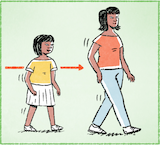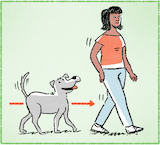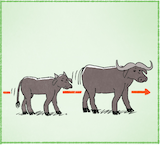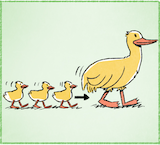



เขากำลังเฮ็ดหญัง เขากำลังญ่างนำกัน
มีแม่พุหนึ่งกับลูกพุหนึ่ง
แม่เป็นพุหญิง ลูกกะเป็นพุหญิง เป็นเด็กน้อย ใส่กะโปงสีขาว ใส่เสี้ยสีเหลียง แม่ใส่กางเกงขาญาว กางเกงสีฟ้า ใส่เสี้ยสีส้ม
คนเป็นลูก เป็นเด็กน้อยพุหญิง กำลังญ่างนำแม่ ญ่างนำก้นแม่ ญ่างไปนำแม่
จักว่าเขาสิญ่างไปใส เห็นแต่ว่าเขาญ่างไปนำกันสองคน
18
เขากำลังเฮ็ดหญัง เขากำลังญ่างไปทางหน้า มีหมาโตหนึ่งพ้อม หมาโตบ่ใหญ่หลาย หมาโตตาฮักๆ ตาฮักบักคักหนึ่ง
มันกำลังสั่นหางของมันพ้อม
มันญ่างไปนำคน มันญ่างไปนำพุหญิงพุนี้
มันญ่างนำก้นคน มันคือสิมีความสุขหลาย มันคือสิดีใจหลาย มันกะดิกหางของมันพ้อม มันเลียบลิ้นของมันพ้อม มันคือสิดีใจบักคักหนึ่ง
เบิ่งหมาแล้ว มันเป็นตาฮักบ่ เป็นตาฮักอยู่ เป็นตาฮักบักคักหนึ่ง
มันเป็นตาย้านบ่ บ่ มันบ่ตาย้านดอก หมามันบ่ตาย้านเลย
เบิ่งแล้ว คือสิบ่เป็นตาย้าน คือสิบ่ดุบ่ฮ้ายดอก
19
นี้คืออี่หยัง นี้คือควย
ควยสองโต โตหนึ่งอาดสิเป็นแม่ โตหนึ่งอาดสิเป็นลูก โตใหญ่ๆ นั้นอาดสิเป็นแม่
มันกำลังญ่างไปนำกัน แม่กะญ่างออกหน้า ลูกกะญ่างนำก้นแม่ จักสิญ่างไปใส
ควยมันมีเขาบ่ กะมีอยู่ ควยมันมีเขาอยู่
ควยโตใหญ่ เขามันสิใหญ่
ควยโตใหญ่มีเขาบักใหญ่หนึ่ง แล้วควยโตน้อยมีเขาหน่อยเดียว มีเขาอันน้อยๆ มีเขาอันบ่ใหญ่หลาย มีเขาอันน้อยๆ หนึ่ง
20
นี้คืออี่หยัง นี้คือเป็ด
เป็ดมีอยู่สี่โต โตหนึ่งโตใหญ่ๆ อาดสิเป็นแม่ อีกสามโต โตน้อยๆ อาดสิเป็นลูก
ลูกเป็ดกำลังญ่างไปนำแม่เป็ด ญ่างไปนำก้นแม่เป็ด จักสิญ่างไปใส อาดสิญ่างไปทางหน้า แต่บ่ลู้ว่ามันสิญ่างไปใส
ปากเป็ดมันญาวบ่ กะญาวอยู่ แต่บ่ญาวหลาย
ปากเป็ดมันสิเป็นเปๆ เป็นแบนๆ เป็นอันใหญ่ๆ ญาวจักหน่อยหนึ่ง แต่บ่ญาวหลาย
เป็ดมันมีปีกบ่ มีอยู่ เป็ดมันมีปีก
มันบินได้บ่ บินได้อยู่หน่อยหนึ่ง แต่บินได้บ่หลาย บินบ่ได้คือนก มันสิบินได้ค้ายๆ กับไก่ บินบ่สูง บินพอต่ำๆ
เป็ดมันมีขาจักข้าง เป็ดมันมีขาสองข้าง ขามันสิเป็นเปๆ เป็นแบนๆ เป็นแบนๆ ออก
เป็ดมันกินได้บ่ กินได้อยู่ เป็ดสามาดเอาไปเฮ็ดเป็นแนวกินได้
คนเฮาสิมักเอาเป็ดไปเฮ็ดเป็นแนวกินคือกัน สิต้มกะได้ สิผัดกะได้ สิย้างกะได้ หลือสิแกงกะได้
สามาดเฮ็ดได้หลายอย่าง เอาเป็ดไปเฮ็ดเป็นแนวกินได้หลายอย่าง แล้วแต่คนสิเฮ็ด แล้วแต่คนสิเอาไปเฮ็ดอี่หยัง สามาดเฮ็ดได้หลายอย่างหลายแนว
Link to overview page
Link to dictionary
| Isaan | Pronunciation | Tones | Thai | English/Notes |
|---|---|---|---|---|
| เขา | khao | M | เขา | personal pronoun: he, she |
| กำลัง | gam-laŋ | M-HR | กำลัง | auxiliary indicating continuous or progressive action |
| เฮ็ด | het | H | ทำ | to do, to make |
| หญัง | ɲaŋ | M | อะไร, เป็นหญัง = ทำไม | 1. what {เขากำลังเฮ็ดหญัง = What is he doing?} {ธูปเอาไว้เฮ็ดหญัง = What are incense sticks for?} 2. something, anything, (nothing) 3. เป็นหญัง[...]คือ in initial position: why {เป็นหญังเขาคือใส่บักพิกลงไปในกวยเตียว = Why is he putting chili in [his] noodle soup?} {เป็นหญังหน้าต่างมันคือเปิด = Why is the window open?} {เป็นหญังมันคือมีควนไฟ = Why is there smoke?} |
| ญ่าง | ɲa:ŋ | H | เดิน | to walk {เขากำลังญ่างเว้ากัน = they are walking and talking} {ลูกเป็ดญ่างไปนำแม่เป็ด = the ducklings are [walking] following their mother} {เขากำลังญ่างข้ามสะพาน = she's walking over the bridge} {เขาสิญ่างไปใส = Where is he going?} |
| นำกัน | nam-gan | HR-M | together, jointly, with one another {บ่สามาดใซ้นำกันได้ = can't be used together} {เขากำลังญ่างนำกัน = they are walking together} {เหล้นบ่าดนำกันบ่ = Shall we play basketball?} | |
| มี | mi: | HR | มี | 1. to have 2. there is |
| แม่ | mɛ: | H | แม่ | mother |
| พุ | phu | H | ผู้ | 1. person 2. clf. for people {พุหญิงพุหนึ่ง พุซายพุหนึ่ง = a woman, a man} {ซู่พุซู่คน = everybody} {พุหนึ่งโตจ่อยๆ พุหนึ่งโตบักอ้วนหนึ่ง = one person is slim, the other is fat} Notes: pronunciation: also realized as พู่- |
| หนึ่ง | nʉŋ | H | หนึ่ง | 1. one 2. after adjective: intensifier {บักคักหนึ่ง = very much} {อันบักใหญ่หนึ่ง = very large}, or attenuates the meaning {กะดาดมันแผ่นน้อยๆ หนึ่ง = the piece of paper is [relatively] small} |
| กับ | gap | M | กับ | 1. and {ลุงกับป้า = uncle and aunt} {กวยเตียวหมูกับกวยเตียวไก่ = noodle soup with pork and noodle soup with chicken} 2. with, to {ค้ายๆ กับคำว่า ... = similar to the word ...} 3. prefix in front of foods {กับเข้า = side dishes eaten with rice} {เขากินกับกวยเตียว = he's eating noodle soup} |
| ลูก | lu:k | HF | ลูก | 1. child 2. clf. for balls, fruits (lime), mountains |
| เป็น | pen | M | เป็น | 1. to be, to exist 2. to be able to 3. to suffer, sth. happens to 4. เป็นหญัง[...]คือ in initial position: why? {เป็นหญังเขากะคือแปงฟัน = Why is he brushing his teeth?} {เป็นหญังเคี่ยงบินมันคือสิตก = Why is the airplane falling down?} |
| พุหญิง | phu-ɲiŋ | H-M | ผู้หญิง | woman, female |
| กะ | ga | M | ก็ | 1. then, consequently 2. also |
| เด็กน้อย | dek-nɔ:i | M-HF | เด็ก, เด็กน้อย | child |
| ใส่ | sai | H | ใส่ | 1. to put something in/on {เขาใส่บักพิกในกวยเตียวหลาย = he's putting a lot of chili in his noodle soup} {เขาบีบยาสีฟันใส่แปงสีฟัน = he squeezes toothpaste on the toothbrush} {ก่องเอาไว้ใส่ของ = boxes are there to put stuff in} 2. to wear (clothes) {เขาใส่เสี้ยแขนญาว = he's wearing a long-sleeve} 3. directed at {เอิ้นใส่กัน = to call each other/to say to each other} {หมามันเห่าใส่แมว = the dog barks at the cat} {ล้องเพงใส่ไม = to sing into the microphone} {เขากำลังซี้มือไปใส่พุซาย = she's pointing at the man} |
| กะโปง | ga-po:ŋ | M-M | กระโปรง | skirt Notes: see also สิ้น |
| สี | si: | M | สี | 1. color 2. colored pencil, crayon |
| ขาว | kha:o | M | ขาว | white |
| เสี้ย | si:a | LF | เสื้อ | shirt |
| เหลียง | li:aŋ | M | เหลือง | yellow |
| กางเกง | ga:ŋ-ge:ŋ | M-M | กางเกง | trousers Notes: synonym: ส้ง |
| ขา | kha: | M | ขา | leg {ขาหน้า = front leg} {ขาหลัง = hind leg} {ส้งขาญาว = long trousers} |
| ญาว | ɲa:o | HR | ยาว | long |
| ฟ้า | fa: | HF | ฟ้า | 1. sky {เคี่ยงบินมันกำลังบินขึ้นฟ้า = the airplane is taking off into the sky} 2. color: blue |
| ส้ม | som | LF | ส้ม | 1. fruit: orange 2. color: orange |
| คน | khon | HR | คน | person, people |
| นำ | nam | HR | 1. at, in 2. with, together with {บ่สามาดถือไปนำได้ = [you] can't carry it around} {กินบักแตงโมนำเฮาบ่ = Will you eat watermelon with me?} 3. to lead, to accompany, to go with {เด็กน้อยญ่างไปนำแม่ = the daughter follows her mother} |
|
| ก้น | gon | HF | หลัง | behind {ญ่างนำก้นแม่ = [she's] walking behind [her] mother} |
| ไป | pai | M | ไป | 1. to go 2. auxiliary indicating action extending into the future |
| จัก | jak | M | จัก | 1. answer to a question: [I] don't know, don't know exactly, [I'm] not sure {พุซายคนนี้เขาเถ้าไป่ จัก จักเถ้าหลือบ่เถ้า เบิ่งบ่ค่อยออก = Is this man here already old? I don't know. I can't see clearly whether he's old or not.} {เขาเว้ากันอยู่ใส จักคือกัน = Where are they talking? I don't know either.} 2. exact(ly), what exactly {จักต้มอี่หยังกะบ่ฮู้ = I don't know what (exactly) he is cooking} {บ่ลู้คือกันจักปาอี่หยัง = I don't know either what kind of fish this is} 3. how much/many? {ต้นไม้มีจักต้น = How many trees are there?} {ตอนนี้จักโมงแล้ว = What time is it now?} {มือของเฮานี้สิมีจักนิ้ว = How many fingers do our hands have?} 4. a bit, a little bit {จักหน่อย/จักหน่อยหนึ่ง = a bit, a little bit} |
| ว่า | wa: | H | ว่า | 1. that, as {คำว่า X = the word X} 2. to say |
| สิ | si | M | จะ | future tense auxiliary {เขากำลังสิตื่น = he's about to wake up} {สิไปตะหลาด = [I'm] going to the market} |
| ใส | sai | M | (ที่)ไหน | 1. where? {สิไปใส = Where are [you] going?} {มาแต่ใส = Where are [you] coming from?} {กะทะอยู่ใส = Where's the pan?} 2. somewhere, anywhere {ใสกะได้ = anywhere, wherever you like} |
| เห็น | hen | M | เห็น | to see |
| แต่ว่า | tɛ:-wa: | H-H | แต่ว่า | 1. but 2. only {ฮู้แต่ว่าเขายืนอยู่พุเดียว = I only know that he's standing there by himself} |
| สอง | sɔ:ŋ | M | สอง | two |
| ทางหน้า | tha:ŋ-na: | HR-LF | ทางหน้า | forward, in front (of) |
| หมา | ma: | M | หมา | dog |
| โต | to: | M | ตัว | 1. body, self 2. clf. for animals, characters/letters/consonants, appliances, clothes (e.g., pairs of trousers, shirts) |
| พ้อม | phɔ:m | HF | พร้อม | at the same time, also, too {มีตะเว็นพ้อม = the sun's out, too} {กะทะมีด้ามพ้อม = the pan has also a handle} |
| บ่ | bɔ: | H | ไม่ | 1. no, not 2. question particle, transforming a statement into a question Notes: spelling exception in line with common usage on social media |
| ใหญ่ | ɲai | H | ใหญ่ | large, big |
| หลาย | la:i | M | เยอะ, มาก | many, much, very |
| ตาฮัก | ta:-hak | M-H | น่ารัก | cute, lovely |
| บักคักหนึ่ง | bak-khak-nʉŋ | M-H-H | intensifier: very, very much (variant of คัก) | |
| มัน | man | HR | มัน | it (also used to refer to people) |
| สั่น | san | H | สั่น | tail of dog: to wag |
| หาง | ha:ŋ | M | หาง | tail |
| ของ | khɔ:ŋ | M | ของ | of, belonging to |
| นี้ | ni: | HF | นี้ | 1. this 2. here |
| คือ | khʉ: | HR | คือ | 1. to be, to resemble, like, as 2. why {บักหล้าคือบ่เก็บโต่ะแน่ = [addressing a young boy] Why haven't you cleared the table?} |
| ความสุข | khwa:m-suk | HR-M | ความสุข | happiness |
| ดีใจ | di:-jai | M-M | ดีใจ | happy, glad |
| กะดิก | ga-dik | M-M | กระดิก | tail of dog: to wag |
| เลียบ | li:ap | HF | แลบ | tongue: to stick out {มันเลียบลิ้นของมันพ้อม = [the dog] is sticking out its tongue, too} |
| ลิ้น | lin | HF | ลิ้น | tongue |
| เบิ่ง | bəŋ | H | ดู | 1. to look at, to see, to watch {เบิ่งโทละทัด = to watch TV} {เบิ่งหนัง = to watch a movie} 2. to guess {เบิ่งซงแล้ว ... = [I] guess / from what it looks like ...} |
| แล้ว | lɛ:o | HF | แล้ว | 1. finished 2. already 3. and then, and next (especially แล้วกะ) 4. auxiliary for past tense |
| อยู่ | yu: | H | อยู่ | 1. to be (located) at 2. yet, still 3. auxiliary indicating continuous or progressive action {ทอดปาอยู่ในกะทะ = (in the process of) frying a fish in the pan} {แม่กำลังเมี้ยนเฮียนอยู่ = mother is cleaning/tidying up the house} |
| ตาย้าน | ta:-ya:n | M-HF | น่ากลัว | scary, not safe |
| ดอก | dɔ:k | LF | หรอก, ดอก | 1. particle used after a negative, relativizing or explanatory statement to make the sense milder {กินเข้าบ่ บ่กินดอก = Are you going to eat [with us]? No.} {เป็นก้อนสี่เหลี่ยม ก้อนน้อยๆ ดอก = These are cubes, small cubes.} {แล้วกะมีลดคันหนึ่งขี่ผ่านมา เป็นลดเก็งดอก = And there's a car passing, a sedan.} 2. particle used to emphasize (not necessarily a negative) contrast 3. particle used for emphasis {ดอกไม้นี้งามบ่ กะงามอยู่ เบิ่งงามๆ ดอก = Is this flower beautiful? Yes, it's beautiful, it looks beautiful} |
| เลย | lə:i | HR | เลย | 1. futher on, beyond, past {เข็มน้อยเลยเลขสิบสองไป = the minute hand has passed number twelve} 2. too much 3. at all 4. definitively 5. completely, utterly |
| ดุ | du | M | ดุ | fierce, savage, unfriendly |
| ฮ้าย | ha:i | HF | ร้าย | fierce, savage, bad, evil, dangerous |
| อี่หยัง | i:-yaŋ | H-M | อะไร | 1. what {นี้คืออี่หยัง = What is this?} {มื้อนี้เจ้าเฮ็ดอี่หยัง = What are you doing today?} {กินเข้างายกับอี่หยัง = What did you have for breakfast?} 2. something, anything, (in negations) nothing {บ่ต้องเฮ็ดอี่หยังอีกเลยนอกจากใส่ปุย = [we] don't need to do anything besides adding fertilizer} |
| ควย | khu:ai | HR | ควาย | water buffalo |
| อาด | a:t | LF | อาจ | 1. might, may, will 2. likely |
| นั้น | nan | HF | นั้น | that, there |
| ออก | ɔ:k | LF | ออก | 1. to go out, to leave 2. out |
| หน้า | na: | LF | หน้า | 1. front {ปะตูหน้า = front door} 2. face {เขากำลังล้างหน้า = he's washing his face} 3. auxiliary: conditional tense {เขาหน้าสิเป็นพุบ่าวพุสาวกัน = they are probably groom and bride} {กะหน้าสิส้มอยู่ = it's likely to be sour} 4. season {หน้าฮ้อน = hot season} 5. page 6. clf. for pages {เฮาอ่านฮอดหน้านั้นแล้ว = we've read until this page} |
| เขา | khao | M | เขา | horn {ควยมันมีเขาพ้อม = water buffaloes have horns} |
| บัก | bak | M | 1. intensifier before adjectives {ปาโตบักใหญ่ = a (very) large fish} 2. prefix in front of fruits and vegetables {บักแตงโม = watermelon} 3. can be used as a reference for a male person of the same or younger age {บักอันนี้ = this lad} |
|
| น้อย | nɔ:i | HF | น้อย | 1. few, little 2. small |
| หน่อยเดียว | nɔ:i-di:ao | H-M | นิดหน่อย | a bit, a little bit, not much Notes: see also หน่อยหนึ่ง |
| อัน | an | M | อัน | 1. thing, object 2. general clf. for objects |
| เป็ด | pet | M | เป็ด | duck |
| สี่ | si: | H | สี่ | four |
| อีก | i:k | LF | อีก | 1. more, again 2. other, another |
| สาม | sa:m | M | สาม | three |
| แต่ | tɛ: | H | แต่ | 1. but {แต่บ่ต่างกันหลาย = but not very different} {แต่บ่ลู้ว่าเขาญ่างมาแต่ใส = but [I] don't know where he's coming from, see also: แต่ว่า} 2. only {ตอนนี้มีแต่ขี้ฝ้า = now there are only clouds} |
| ลู้ | lu: | HF | รู้ | 1. to know 2. to understand Notes: equivalent to ฮู้ |
| ปาก | pa:k | LF | ปาก | mouth |
| เป | pe: | M | แบน, เรียบ | flat {ปากเป็ดมันสิเป็นเปๆ = the beak of the duck is flat} |
| แบน | bɛ:n | M | แบน | flat |
| หน่อยหนึ่ง | nɔ:i-nʉŋ | H-H | นิดหน่อย | a bit, a little bit, not much Notes: see also หน่อยเดียว |
| ปีก | pi:k | LF | ปีก | wing |
| บิน | bin | M | บิน | to fly |
| ได้ | dai | HF | ได้ | 1. can 2. to get, to obtain 3. before verb: indicating past tense 4. บ่ได้ + verb: not |
| นก | nok | H | นก | bird |
| ค้าย | kha:i | HF | คล้าย | to resemble, to be similar, to be alike {ทัพพีเป็นค้ายๆ กับซ้อน = a ladle is similar to a spoon} |
| ไก่ | gai | H | ไก่ | chicken |
| สูง | su:ŋ | M | สูง | high, tall |
| พอ | phɔ: | HR | พอ | 1. just when, just after, as soon as 2. enough, adequate |
| ต่ำ | tam | H | ต่ำ | low |
| ข้าง | kha:ŋ | LF | ข้าง | 1. side {มีหูจับสองข้าง = there are handles on both sides} 2. next to {วางอยู่ข้างๆ ก่องใบใหญ่ = it's placed next to the large box} {เขายืนอยู่ข้างๆ อีกพุหนึ่ง = he's standing next to another person} 3. clf. for body parts which come in pairs (eyes, ears, legs etc.) {เขามีตาสองข้าง = she has two eyes} |
| กิน | gin | M | กิน | to eat, to consume, to use |
| สามาด | sa:-ma:t | M-HF | สามารถ | can, to be able |
| เอา | ao | M | เอา | to take, to give {เขากำลังเอาก่องไปซั่ง = he's taking the boxes to weigh them} {หมอกำลังเอายาให้คนป่วยกิน = the doctor is giving medicine to the patient} {เอาไว้ถ้า = is for, is used for, has the purpose of} |
| แนวกิน | nɛ:o-gin | HR-M | อาหาร | food {เฮ็ดแนวกิน = to prepare food} {ตำบักหุ่งเนี้ยกะสิเป็นแนวกิน = papaya salad is (a kind of) food} |
| เฮา | hao | HR | เรา | 1. personal pronoun: we 2. personal pronoun: I |
| มัก | mak | H | ชอบ | to like, to love, to want, to desire |
| คือกัน | khʉ:-gan | HR-M | เหมือนกัน | 1. also, likewise, similarly {ยินดีที่ได้ฮู้จักคือกันคับ = Nice to meet you too!} 2. in negative sentences: either {บ่ลู้คือกัน = I don't know either} {จักคือกัน = I don't know (either)} |
| ต้ม | tɔm | HF | ต้ม | to boil |
| ผัด | phat | M | ผัด | to fry, to stir-fry |
| ย้าง | ya:ŋ | HF | ย่าง | to roast, to grill Notes: alternative pronunciation ญ้าง (HF) |
| หลือ | lʉ: | M | หรือ | or |
| แกง | gɛ:ŋ | M | แกง | 1. soup, stew, curry 2. to make a soup/stew/curry |
| อย่าง | ya:ŋ | H | อย่าง | type, kind, sort, category |
| แล้วแต่ | lɛ:o-tɛ: | HF-H | แล้วแต่ | up to, depending on |
| แนว | nɛ:o | HR | 1. kind, sort, type 2. method, mode of action - and the corresponding tool or object, thing {แนวนุ่งห่ม = clothes, clothing} {แนวคม = sharp object [e.g., a pair of scissors]} {แนวถือ = handle} 3. clf. for words starting with แนว {กินแนวอันนั้น = กินแนวกินอันนั้น = to eat this food [which was talked about earlier]} |